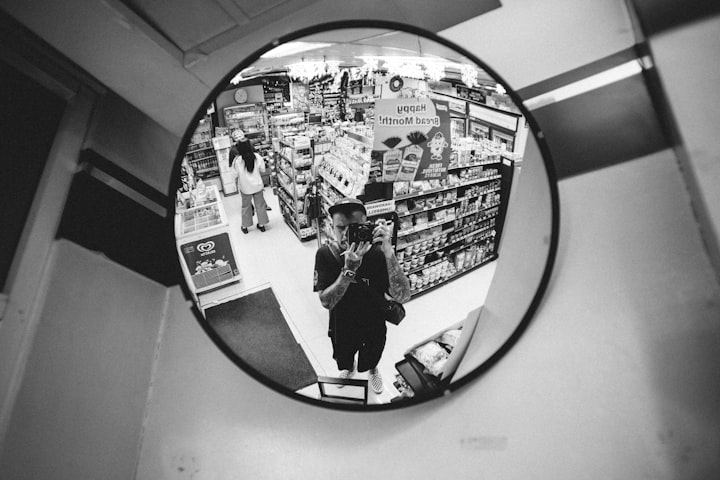
Words. One carefully constructed sentence can change someone’s mind, save a life, end a war, make a statement, or start a revolution. A word can also tear a person’s life apart, or kill the imagination, or punch an unfillable hole in someone’s self-esteem. Words create universes. We can't take words back, regardless of how they make us or others feel. Words transport us, bind us, and set us free. What is a character, but a string of well-placed adjectives, describing a face, a mind, a temperament, a purpose, and a motivation? Words influence, distract, and challenge us to read, learn, and evolve.
I grew up as a child of Generation X. My dad has had many professions in his life; he owned an ice cream parlor, managed a fast food restaurant, killed bugs for an exterminator, and mowed lawns. He did many things, but I didn’t see any of those things bring him great joy. Dad always seemed happiest when he was telling stories or jokes or entertaining in some way.
I spent a great deal of time reading. I had an active imagination that wasn’t satisfied with reality; I chose books to transport me to another world. When I was eight or nine, I was up late, reading C.S. Lewis’s The Magician’s Nephew. I was hooked and didn’t want to put the book down. My dad, however, wanted me to go to bed.
“Kathryn, put the book down, turn off your light, and go to bed. Now.”
“Okay.”
Instead of putting down my book and going to sleep, I snuck to the hall closet, got a towel, put it over my lampshade, and continued reading. Not long after, that towel caught fire. My room started filling with smoke. I threw my book to the ground, grabbed the towel by a corner, and ran screaming to the bathroom. My parent’s bedroom door flew open, and my dad came running out in his underwear. He took the towel from me, put it in the sink, and doused it with water.
He went around opening windows, letting the smoke out. My dad was flustered and mad, and I was scared and crying my eyes out.
“What happened?”
“You told me to go to bed, but I wanted to read.”
“How did the towel catch fire?”
“I put it over my lamp so you wouldn’t see the light.”
My dad was silent for a moment. His anger quieted.
“Kathryn, you can read as much as you want. Just don’t catch the house on fire.”
There’s a popular meme I’m fond of called ‘Disaster Girl.’ It’s the one where a young girl is standing outside with a Mona Lisa smile while a house burns across the street. I’m sure every reader will be familiar. Every time I see that meme, much like Anne of Green Gables often says, I feel I’ve found a kindred spirit.
If someone had asked me then what I wanted to be when I grew up, I would have said an adventurer, archeologist, or a princess; anything. I wanted to be anything but a writer. I wanted to be like the characters in books. I loved stories, and eventually, I loved to tell stories. But I still didn’t understand that I could write those stories. It took a little over thirty more years before I came to that conclusion. So many of us never reach our full potential just because we feel it is impossible.
I read an article the other day which correlated Shakespeare’s prolific writings to him living during the time of a plague. Oddly, the idea warmed my heart. I didn’t start writing until about a year before the Covid-19 pandemic began and didn’t write professionally until months later. For some reason, our plague has brought me closer to myself. I feel a great compulsion to get these words out, tell my stories, and be heard. I know that is the same for many of us.
Stories come quickly to me. Words are my best friends, and I’m a storyteller, just like my father. Twenty years ago, my dad told me he had an idea for a story before I even understood what an adjective was. He thought it would make a great movie. He didn’t suggest it as a book. I was attending an acting conservatory in New York City at the time. I excelled at acting and was bored with almost every other subject.
Dad thought that maybe because I was studying theater, I would be able to write a screenplay. I’d never attempted anything of the kind, and I had no idea how to start. I didn’t think I could write. After all, I couldn’t tell my nouns from my verbs. Instead, my life got interrupted by 9/11. After graduating, I didn’t act again for a decade.
Before the pandemic, I was teaching theatre, improvisation, and playwriting. Several years ago, I had an idea for a story, and when the shutdown occurred, I started writing. In October of 2020, I self-published that book. Currently, I’m co-writing my first book with a traditional publisher, a stand-alone thriller. I’m also writing the second book in my series. Beyond that, though, I’ve got another project.
My dad and I have dusted off his twenty-year-old idea and are working to turn it into a novel. He never considered writing; he can barely read his handwriting. It’s the same with me. My husband constantly teases me about not understanding my scribbles. I have to type out my thoughts. I would finish nothing if I wrote everything by hand, and second, whatever got written would be indecipherable.
My dad purchased a voice recorder so he can speak his words. He’s learning how to outline his idea. Once the outline is complete, together, we’ll write the book. It’s a great idea. It was a great idea twenty years ago and still is today. My dad is seventy-two, and I’m forty-six, and we’re going to prove it is never too late to do what you love.
I’m a writer and a storyteller. So is my dad. He was telling stories long before me. When I was a child, rebelliously covering my lamp with a towel and nearly catching my light on fire, he could have punished me. He could have poured water on my imagination, but instead, he recognized my eager mind. He knew I loved reading. He understood what the stories meant to me, as much as they meant to him.
Nobody ever told my dad that being a writer was a choice. He was never encouraged in that direction. When I first mentioned that we should turn his idea into a book, he laughed.
“Kathryn, I can’t read my handwriting.”
“Neither can I,” I said.
Putting the words on paper is just one of the steps to writing. First, there’s the idea. Then out of the concept comes the story and the characters. I told my dad that he’d been storytelling all his life and that I would help him write it.
Finding new ways to construct a sentence fascinates me. I dream of inventing new words someday, like Shakespeare, but I will be content with arranging the existing words. Shakespeare said that the pen is mightier than the sword, and that’s the truth. We are living in an uncertain world right now. It is a world that needs escapism more than ever, a world that needs new words. We have so many reasons to doubt and fear. Our minds become whatever we see, hear, and read.
I love my job because every day, I get an opportunity to make an impact. I can write words to heal or make a statement. I write words that make people laugh or cry. If something in our world is bothering me, my words are my opinion and an opportunity to influence minds. If I’m happy, I write. If I’m frustrated, I write. If I’m tired, I write. If I’m angry, I write. Whatever my mood, I write, and one way or another, I find myself.
I write to entertain, stop hate, unite, understand, and be understood. I write to terrify and to encourage thought. I write to change minds. I write to change my mind. I write to get it all out. I write to feed my brain. I write so I can watch my husband read my words. I write because I love the feeling of my fingers typing. I love to close my eyes and write blindly for as long as I can, and then open my eyes to see how many mistakes I’ve made if any.
I love to talk about writing with my father and see him become enthusiastic about the plot and character. I love to see the thoughts wake up in his eyes and to hear the excitement in his voice every time he comes up with a new idea. I’m seeing a new side of my dad, and he sees himself in a different light.
Words. One carefully constructed sentence can change someone’s life, mend a fence, begin a journey, or awaken a dream. A word can set your imagination free, or ignite a fire, or put one out. Words create our reality. Words move us, connect us, and bring us toward the truth. What is a writer, but a lover of nouns, verbs, and adjectives, describing an idea, a story, telling the truth, and playing god with sentences?
Sometime in the next year, I hope to see my dad’s name on the cover of a book. I look forward to seeing the look on his face the first time he has the finished product in his hands. Even if my words only change one life, and even if that one life is my father’s or my own, they will have made an impact.
About the Creator
Kathryn Susanne Sterling
Kathryn Susanne Sterling is the author of Edith, Awake: Part One of The Name Series. Her second novel, The Anomaly, will be released in 2021. She lives in Texas with her husband, John, three assassin cats, and one overly emotional dog.






Comments
There are no comments for this story
Be the first to respond and start the conversation.